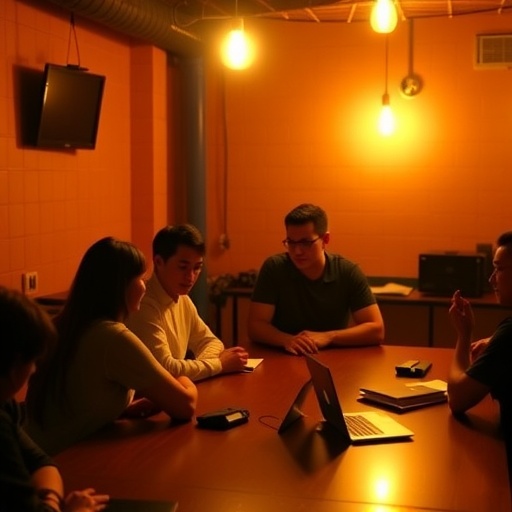A groundbreaking study recently published in the esteemed journal Behavioral Science has unveiled novel insights into how distinct types of narcissism distinctly shape team morale, cohesion, and overall performance in dynamic, goal-oriented environments. Conducted by Dr. Reece Bush-Evans and a multidisciplinary team of psychologists from Bournemouth University in collaboration with colleagues from the Universities of Southampton, Portsmouth, and Winchester, this research leverages naturalistic escape room settings to simulate real-world teamwork, providing an innovative lens on narcissistic personality traits within collective problem-solving contexts.
The study engaged over 100 participants, meticulously organized into small groups tasked with navigating the complexities of escape room challenges. These scenarios demanded not only intellectual agility but also a synchronized interplay of trust, communication, and mutual respect—skills integral to success both in the study’s playful context and, more critically, within professional team settings. The researchers recorded nuanced interpersonal dynamics and behavioral patterns exhibited by group members, laying the foundation for an in-depth exploration of how varying narcissistic behaviors influence team functionality.
Central to the investigation was the differentiation between two core expressions of narcissism: narcissistic admiration and narcissistic rivalry. Narcissistic admiration is typified by individuals who exude charisma, confidence, and seek positive recognition from their peers, often positioning themselves as attractive leaders or central figures within social groups. Conversely, narcissistic rivalry manifests through combative, defensive, and often antagonistic behaviors that tend to undercut collaboration, as these individuals actively dismiss others’ contributions and are quick to perceive slights or competition where none may exist.
Throughout the tasks, participants rated themselves and each other on key personality traits, including friendliness, trustworthiness, confidence, and aggression, both prior to and following the challenges. This dual-timepoint evaluation enabled researchers to capture shifting perceptions and their repercussions on team dynamics, particularly focusing on cohesion, internal conflict, and collective problem-solving efficacy—measured concretely by whether teams succeeded in escaping the rooms under time constraints.
The results were illuminating. Groups with higher concentrations of narcissistic rivalry exhibited significantly reduced unity, marked by increased conflict and fragmentation, which in turn markedly diminished their likelihood of successfully completing the escape challenges. Dr. Bush-Evans elaborated that rivalrous individuals showed tendencies to disregard the value of their peers’ ideas, withhold pivotal information, and generally foster an atmosphere of frustration and disengagement, thereby fracturing the crucial bond needed for effective teamwork.
Contrarily, those exhibiting narcissistic admiration did not appear to significantly influence team success or failure rates. However, their presence introduced a subtler effect: while initially their confidence and charm garnered positive attention, over time teammates increasingly perceived these individuals as arrogant and less industrious. This suggests that admiration-driven narcissists may initially inspire, but sustained leadership or contribution demands a balance beyond mere charisma.
This nuanced distinction between admiration and rivalry in narcissistic behavior carries profound implications for organizational settings where teamwork and innovation are paramount. In modern face-to-face, virtual, and hybrid workplaces, misinterpreting charismatic self-assurance for actual collaborative competence can lead to misplaced trust and hindered team outcomes. The data underscore that loud or spotlight-seeking voices are not synonymous with effective contribution or leadership.
Furthermore, the study advances the understanding that optimal team performance hinges on fostering cooperative environments where listening and inclusivity are valued as highly as assertiveness and vocal idea-sharing. Teams that prioritize mutual respect and open communication processes outperform those merely dominated by expressive, confident individuals lacking substantive engagement.
The innovative use of escape rooms as an experimental paradigm proved particularly effective in capturing authentic social interactions under pressure, reflecting the complex, often unpredictable nature of real-world team endeavors. It allowed researchers to observe spontaneous behaviors without the artificial constraints of traditional laboratory settings, enhancing ecological validity and the applicability of findings to diverse group contexts.
In sum, this research challenges prevailing misconceptions about the role of narcissistic traits in team settings, spotlighting the damaging potential of rivalry-driven narcissism and the equivocal impact of admiration-driven narcissism on collective achievement. It calls for leaders and organizations to cultivate cultures that champion collaboration, psychological safety, and balanced recognition of diverse interpersonal styles to maximize group potential.
Dr. Bush-Evans emphasizes the broader relevance of these insights, advocating for leadership paradigms that recognize and reward good listening and cooperative dispositions alongside innovative, outspoken input. Failure to do so risks undermining team cohesion and, ultimately, organizational success.
As workplace dynamics continue to evolve with an increasing blend of in-person and digital collaboration, this research provides timely and critical guidance on the interpersonal traits that enhance or impede effective teamwork. Future investigations may build on these findings to develop targeted interventions aimed at mitigating the negative effects of narcissistic rivalry, potentially revolutionizing team management practices across industries.
Subject of Research: People
Article Title: Narcissism in Action: Perceptions, Team Dynamics, and Performance in Naturalistic Escape Room Settings
News Publication Date: 27-Oct-2025
Web References: http://dx.doi.org/10.3390/bs15111461
References: Behavioral Science, DOI: 10.3390/bs15111461
Keywords: Behavioral psychology, Psychological science, Social psychology, Experimental psychology, Sociology




